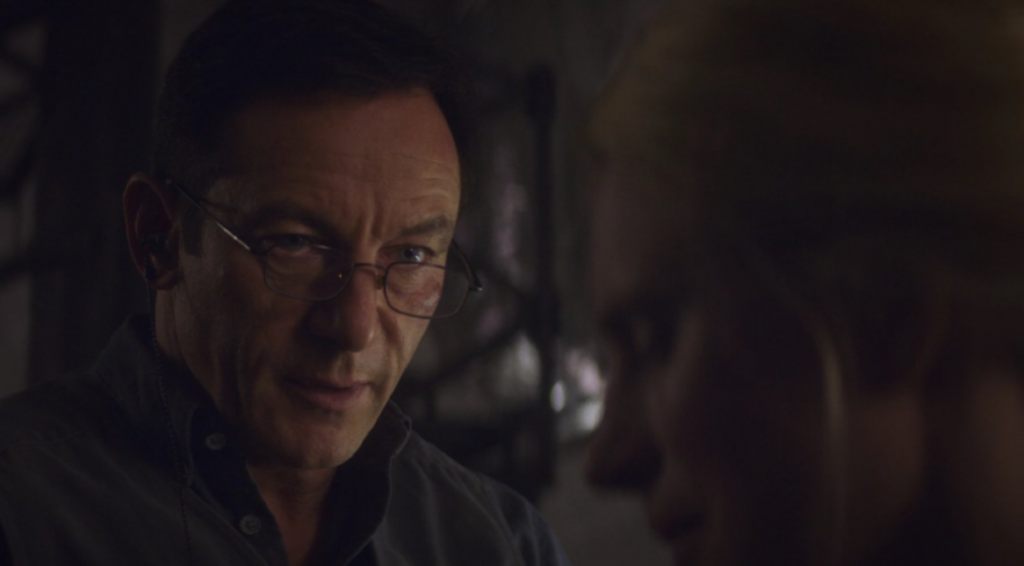Beyond Words, by Reed Lackey
4 Jan
Netflix has certainly earned its place among the pioneers of serialized storytelling. Their original films, though ranging in quality, have certainly established a brand to notice and to follow. Among the latest additions to that brand is an eight-chapter story called The OA, which poses as a mini-series but feels more akin to a seven and a half hour film (or a short novel for TV viewers).
Knowing how much to reveal about The OA is tricky. There are elements of this story which deserve to be discovered rather than briefly summarized. However to say anything substantial demands a certain disclosure of narrative beats.
On technical levels, it is undeniably visionary. Its scripts are compelling and deftly balance an ambitious and textured story. Not everything works quite right — there are underdeveloped characters, even among our core groups, and more than one plot thread feels painfully unresolved — but the pacing is steady and the reveals are well-placed, successfully blended and bending at least three different genres within a single story.
This is the kind of show that was destined for the binge era. I’m not sure it would ever survive a week-to-week ratings demand, but it commands strong usage of the all-at-once format and playfully subverts expectations with everything from opening credits to episode length (the longest episode is 70 minutes, the shortest is 30).
The performances are nearly all compelling. Brit Marling brings her particular other-worldly qualities to the role of Prairie and not only injects a healthy dose of mystique to the character, but anchors the entire narrative as well (her journey of sight and blindness alone is rich in metaphor and her constant blend of vulnerability and strength is impressive). The other most noteworthy performance for me is Jason Isaacs as Hap, who stunningly balances menace and pathos to craft a complex and provocative villain from what could have easily been a cheap castaway. I could go on with accolades about Scott Wilson, Phyllis Smith, Patrick Gibson, and Brandon Perea, and ultimately the entire cast.
But what really makes this show worth talking about is the mystery at its center. If you’ve read this far, you should know we’re heading into Spoilerville in a moment, but before we do, simply know that as you venture into this story, not everything is going to make sense, because not everything is supposed to. Despite some legitimate plotting misfires, there is a necessity to the mystery at the heart of The OA.
It’s difficult to assess the effect this show has if you devote to its entire length. There were several moments when I wondered if I would watch any more, and several others that gave me chills and emotional resonance I’ve rarely felt. Ultimately, the final moments leave you with more questions than answers, but at the center of it all is a story about endurance, hope, and the eternal power of the creative spirit.
For me, the story hinged on the discovery and usage of the “movements”: peculiar motions uncovered by specific people who have spent time in afterlife worlds following their near-death experiences. (See. I told you it was ambitious). Prairie’s story (and whether or not you think she’s telling the truth) is certainly a fascinating puzzle in its own right, but it is the mysterious power of these movements and the story of their discovery which centered and grounded The OA for me. Where do they come from? What are they? Do they work, and if so, why? (I also found it immensely compelling that movements were remembered by scars. But that’s a whole other essay.)
We watch blood flow in reverse and restore a man to life. We watch crippling disease disintegrate and electricity flicker and fail under the influence of what could essentially be an awkward episode of So You Think You Can Dance. Characters like Hap are desperate to harness the power of these movements (and commit hideous atrocities in efforts to control them), while our five new students of them simply want to know whether or not it’s all the ramblings of an insane runaway.
And let’s talk about those five people for a moment, shall we? At least three of them are in desperate need for redemption and purpose and they all seem to think they’ll find it if they simply commit to the bizarre mission Prairie compels them towards. There are moments for each of them when such hopes and dreams seem unobtainable (especially when considering the compelling evidence that Prairie may simply be insane).
But in the final moments of The OA, a crisis unifies both the people and the movements in a moment that will either make you burst out in mocking laughter or be deeply moved by a stunning display of the power of mystery and creativity (not to mention the elements of faith and redemption). I, for one, found myself in the second camp: bursting at the seams with the thought that maybe some languages can’t be spoken and that what those languages hold might just save us.
These are questions for the angels: mysteries of time and space where something beyond us breaks in and changes things forever. Can wordless mysteries truly intervene in matters of life and death? Can foolish faith in the inexplicable somehow offer up second chances at purpose and hope? Are there paths to places beyond what we could possibly imagine? For five people, things will certainly never be the same.
For the rest of us, there will always be unsolved mysteries and moments too powerful for words, where our only choice is to stand and watch or learn how to move with them.




No comments yet